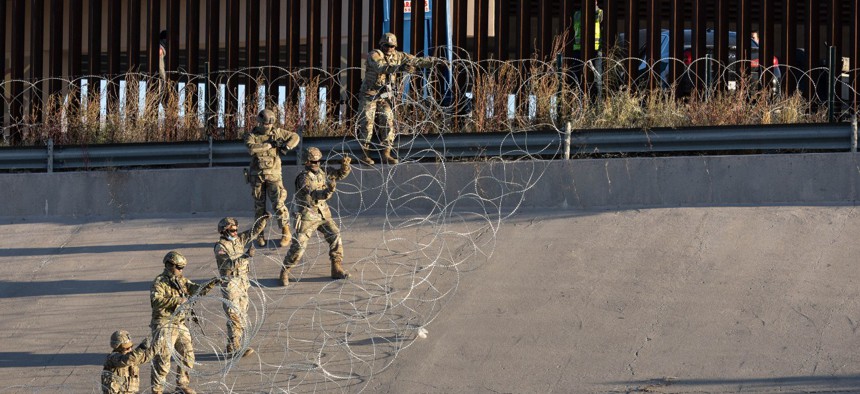
Texas National Guard troops lay down concertina wire to stop migrants from entering a popular crossing area along the bank of the Rio Grande in El Paso, Texas, in December. The Pentagon is sending additional troops to the Southwest border now to help fill “capability gaps” that will not include law enforcement activities. John Moore / Getty Images
As the White House and GOP Make Separate Pushes for More Permanent Staffing, Biden Sends Troops to the Border
Biden follows Trump and others in tapping the Pentagon for support ahead of expected increase in migrant encounters.
As President Biden prepares to send 1,500 military personnel to the Southwest border in advance of an expected significant increase in migrant arrivals, House Republicans are coalescing around a sweeping bill that would revamp immigration laws and require more staffing at federal law enforcement agencies.
The Homeland Security Department asked the Defense Department for assistance ahead of the May 11 end of a pandemic-era policy that allowed the government to immediately turn away millions of migrants arriving at the border. For 90 days, the Pentagon will send troops to the Southwest border to help fill “capability gaps” that will not include law enforcement activities. Instead, they will offer monitoring and detection, data entry and warehouse support.
“DoD personnel have never, and will not, perform law enforcement activities or interact with migrants or other individuals in DHS custody,” DHS said in a statement Tuesday. “This support will free up DHS law enforcement personnel to perform their critical law enforcement missions.”
The deployment mirrors an approach used by the Trump administration in both 2018 and 2019 when it sent troops to the border ahead of expected upticks in migrant arrivals. Biden administration officials noted there are already 2,500 troops at the border and the new addition is standard practice. DHS and Defense made the announcement as the administration prepares for the end of Title 42, the pandemic immigration policy first instituted under President Trump, which officials have estimated could lead to a doubling of daily encounters at the border.
The Biden administration has outlined a series of plans in advance of the May 11 deadline, including deploying officers overseas to conduct asylum screenings abroad, shifting funds and personnel to support border efforts and rewriting asylum rules to make it easier for border personnel to deny entry to migrants. DHS on Tuesday stressed that it is planning to invest in technology and personnel to “reduce its need for DoD support in coming years.” The Pentagon added its troops will serve until DHS can fulfill its needs through contracted support.
Also on Tuesday, House Republicans introduced their package of immigration and border security reforms. The 2023 Secure the Border Act (H.R. 2) would restrict access to asylum, add additional detention facilities, bring back family detention, increase penalties for those who violate immigration laws, limit parole programs and reinstitute wall construction. The measure would set a minimum of 22,000 Border Patrol agents. The agency has a similar floor today, but in reality employs just more than 19,000. At various hearings before Congress, Biden administration officials have conceded border agencies require additional staffing to maintain operational control.
Congress funded an additional 300 Border Patrol agents as part of the fiscal 2023 omnibus spending bill and Biden requested an additional 350 in his fiscal 2024 budget. To support its staffing goal, the Republican bill—which was put forward with the support of leadership—would authorize $100 million to provide retention bonuses to agents who have served for at least five years and work in the equivalent of General Schedule-12 positions or below. The measure would also allow the head of Customs and Border to create blanket waivers from polygraph examination requirements for applicants, which has long slowed down the hiring process.
In 2017, the Trump administration reported that just one-in-four would-be hires passed their polygraphs. Congress required the exams after a rapid buildup of Border Patrol personnel during the George W. Bush administration led to widespread misconduct at the agency.
The Republican bill would also require CBP to develop a new workload staffing model and better track its workforce data.
“The unmanageable chaos at our border has overwhelmed our federal agencies and prevented those with legitimate asylum cases, fleeing murderous dictatorships, from having their case heard and considered,” said Rep. Mario Diaz-Balart, R-Fla., who introduced the bill. “This vicious cycle must end.”
The House is expected to vote on the package in the coming weeks, but the Democratic-controlled Senate is not expected to move the bill. The Biden administration on Tuesday reiterated its request for Congress to support its goal of adding staff and other resources to CBP and other immigration agencies.







